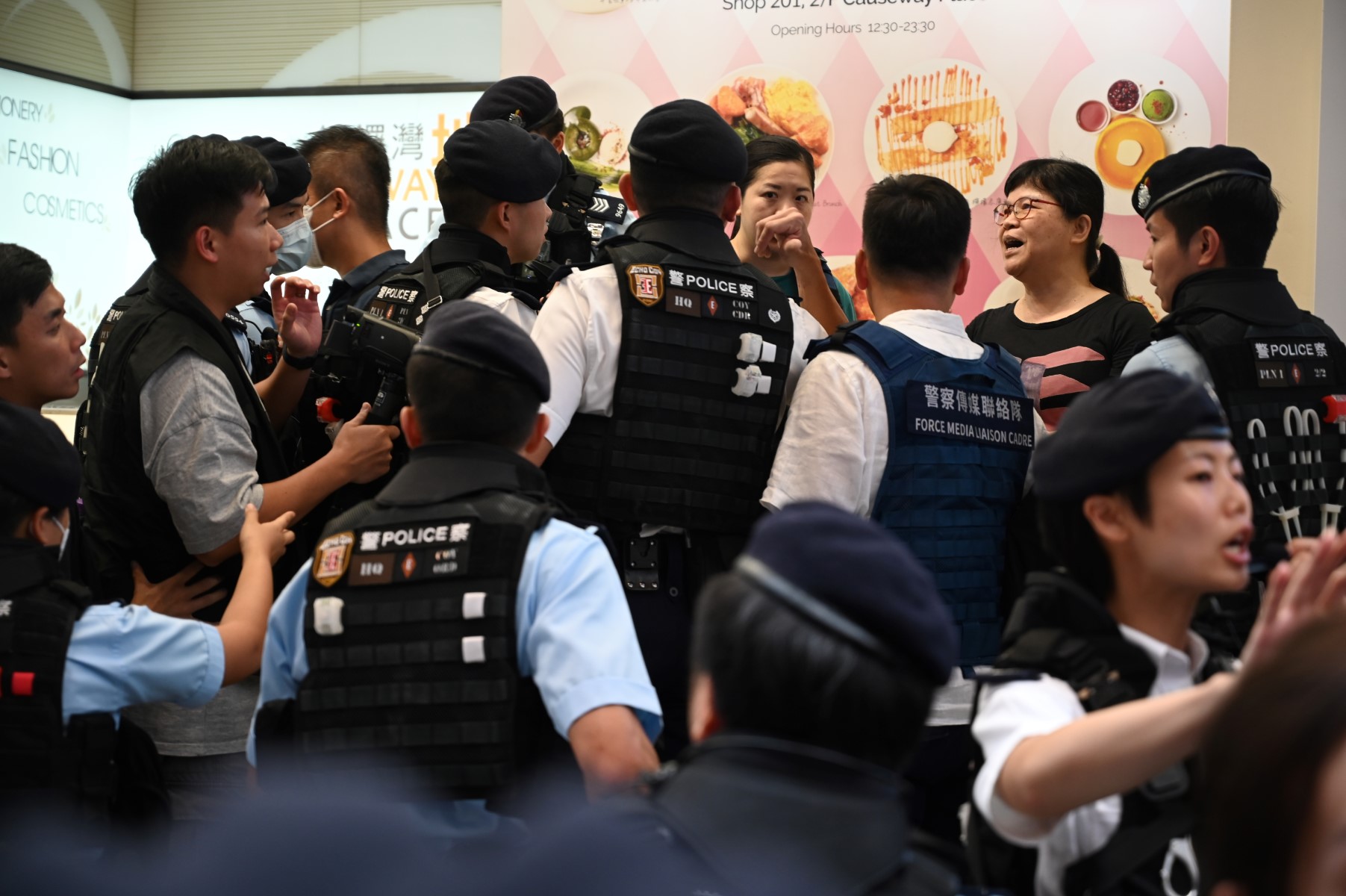
For years, Hong Kongers would converge on the city’s Victoria Park and its surrounding neighbourhood to commemorate the events of June 4, 1989 — taking part in candlelight vigils.
But since Beijing’s imposition of the national security law on Hong Kong in 2020 to quell dissent, the annual vigil was banned, and the organisers were charged under the law.
This weekend, scores of police were deployed in the area, stopping people to search their belongings and question them.
By late afternoon, AFP reporters witnessed at least 10 people taken away by police in vans — including Chan Po-ying, the leader of the city’s League of Social Democrats, one of the last few remaining opposition groups.
The veteran activist was holding a small LED candle and two flowers, before she was immediately seized by police.
Other prominent figures detained were Alexandra Wong, a well-known activist nicknamed “Grandma Wong”, former chairwoman of the Hong Kong Journalists Association Mak Yin-ting, and Leo Tang, a former leader of the now-disbanded Confederation of Trade Unions.
Wong, 67, was carrying flowers as police surrounded her and escorted her away.
At Victoria Park, a man sitting on a bench holding an unlit candle was surrounded by cops. As he was led to a police van, he said, “I raised a candle… I was (taken) for just sitting there.”
Another young man dressed in black carrying a book titled “35th of May” — a covert reference to June 4 in China — was also detained.
One woman who was briefly questioned, searched and then released, shrugged and told AFP: “Everyone knows what day is today.”
Police arrested four people on Saturday for “seditious” acts and “disorderly conduct”, and another four were detained on suspicion of breaching the peace.
By late afternoon Sunday, police had set up a tent in the middle of the busy shopping district where they questioned people out of direct sight of the public.
Forbidden commemoration
Discussion of the Tiananmen crackdown is highly sensitive for China’s communist leadership and commemoration is forbidden on the mainland.
The government sent troops and tanks to Beijing’s Tiananmen Square in 1989 to break up peaceful protests, brutally crushing a weeks-long wave of demonstrations calling for political change.
Hundreds — by some estimates, more than 1,000 — were killed.
For decades, Hong Kong was the only Chinese city with a large-scale commemoration — a key index of the liberties and political pluralism afforded by its semi-autonomous status.
But after the vigil was banned since 2020, the park was barricaded with metal barriers.
This year, Victoria Park was transformed for a “hometown carnival fair” organised by pro-Beijing groups beginning Saturday to celebrate the upcoming 26th anniversary of Hong Kong’s handover from Britain to China.
Erase memories
Beijing has gone to exhaustive lengths to erase the 1989 event from public memory in the mainland.
All mention of the crackdown is scrubbed from China’s internet. On Sunday, officers were posted around Tiananmen Square, at times stopping cyclists.
Over the weekend, sites of more recent protests — a bridge in Beijing where a “freedom” banner was unfurled, and Wulumuqi Street in Shanghai where demonstrations happened in November — also saw heightened security.
The British Embassy in Beijing posted the June 4, 1989, front page of China’s mouthpiece People’s Daily that showed a small report about how hospitals were inundated with casualties.
Within 20 minutes, censors removed the news, the embassy tweeted on Sunday.
Hong Kong authorities were vigilant in the weeks before June 4, with police seizing a commemorative “Pillar of Shame” statue for a security trial and books on the Tiananmen crackdown removed from public libraries.
On Sunday, there were pockets of defiance around Hong Kong — a shop gave away candles, while a bookstore displayed Tiananmen Square archival material.
‘Face the consequences’
Sidestepping questions about whether public mourning was allowed, Hong Kong’s leader John Lee had maintained that the public must act according to the law or “be ready to face the consequences”.
Vigils are planned around the world, from Japan to London, where a re-enactment of the Tiananmen crackdown will take place at Trafalgar Square on Sunday.
In self-ruled Taiwan, which China claims as its territory, workers set up a small replica of the “Pillar of Shame” on Sunday in preparation for a candlelight vigil.
“The history and the memory will not be wiped out easily,” said Hong Konger Sky Fung, secretary-general of Taiwan-based NGO Hong Kong Outlanders.
“The spark is still in our hearts.”



